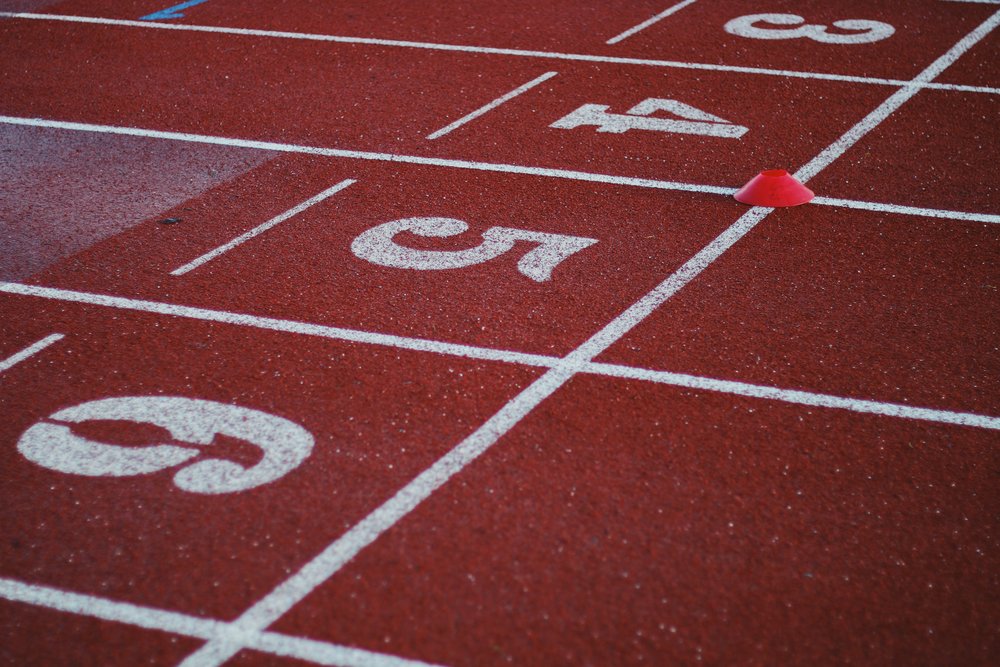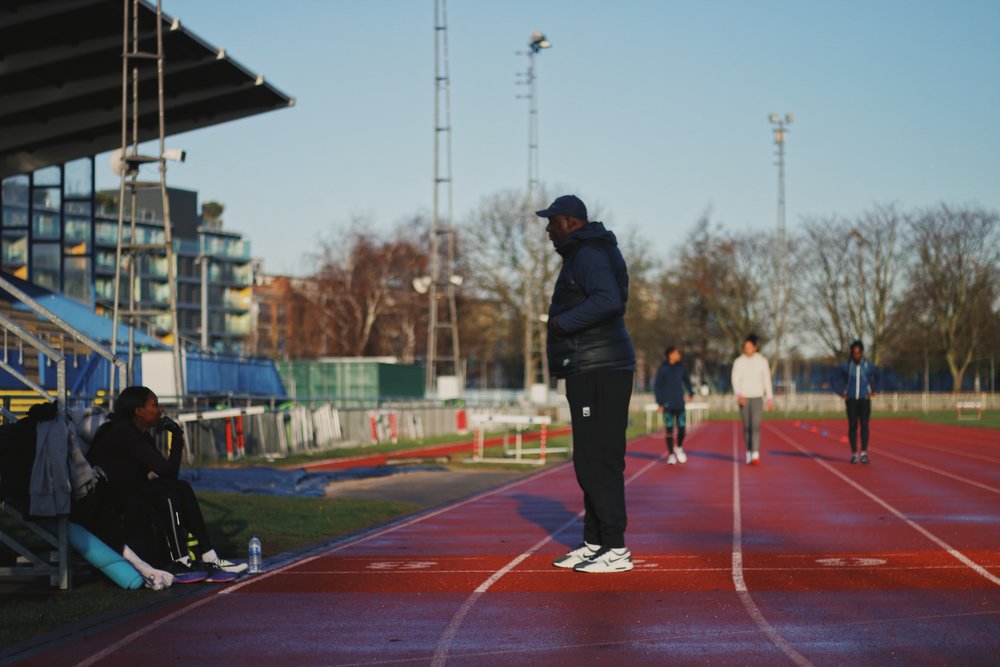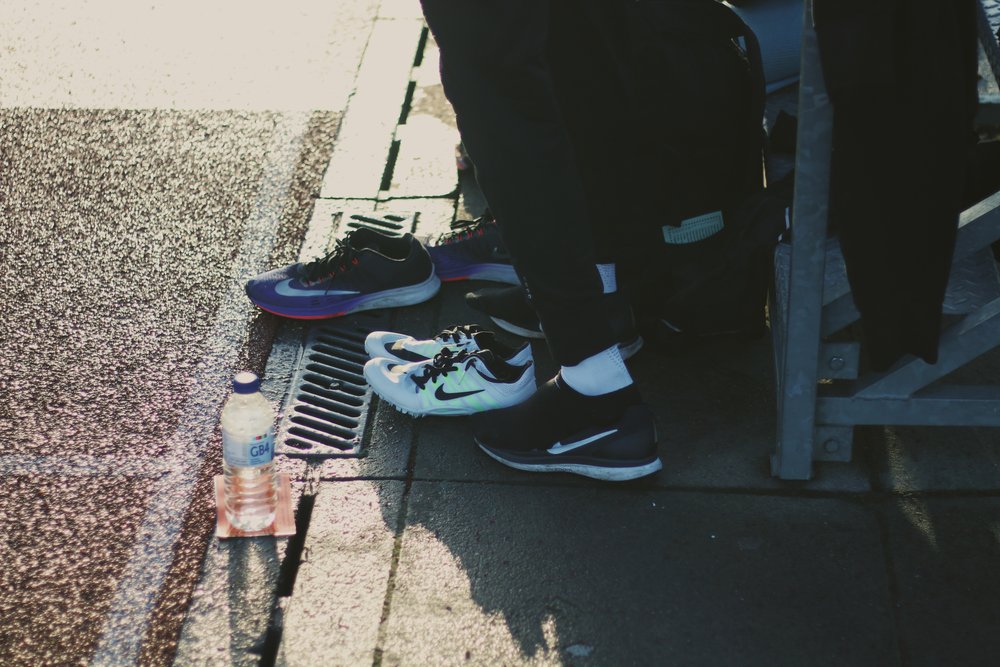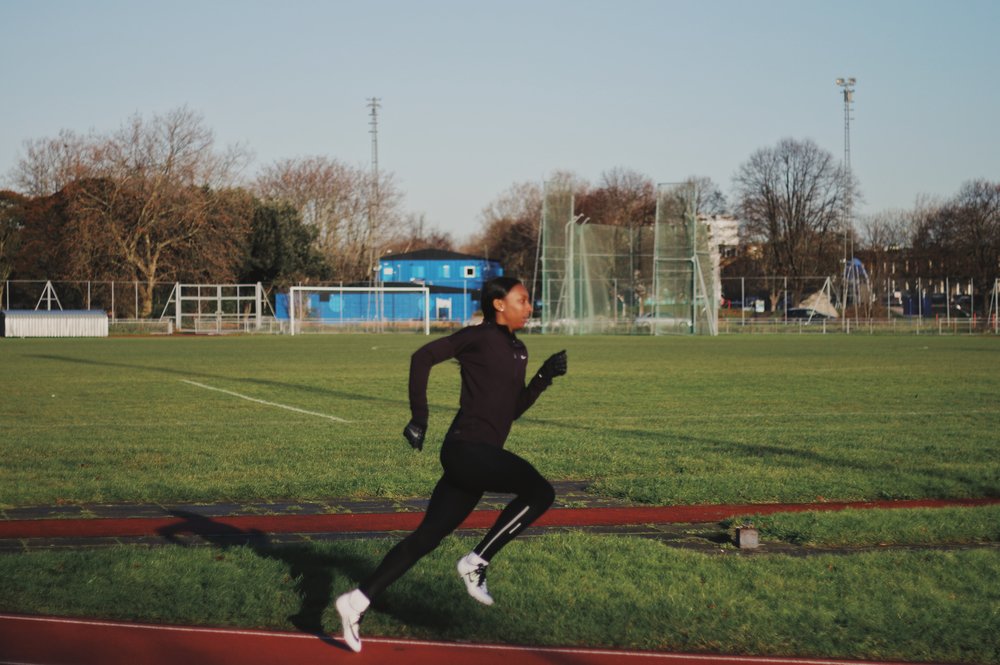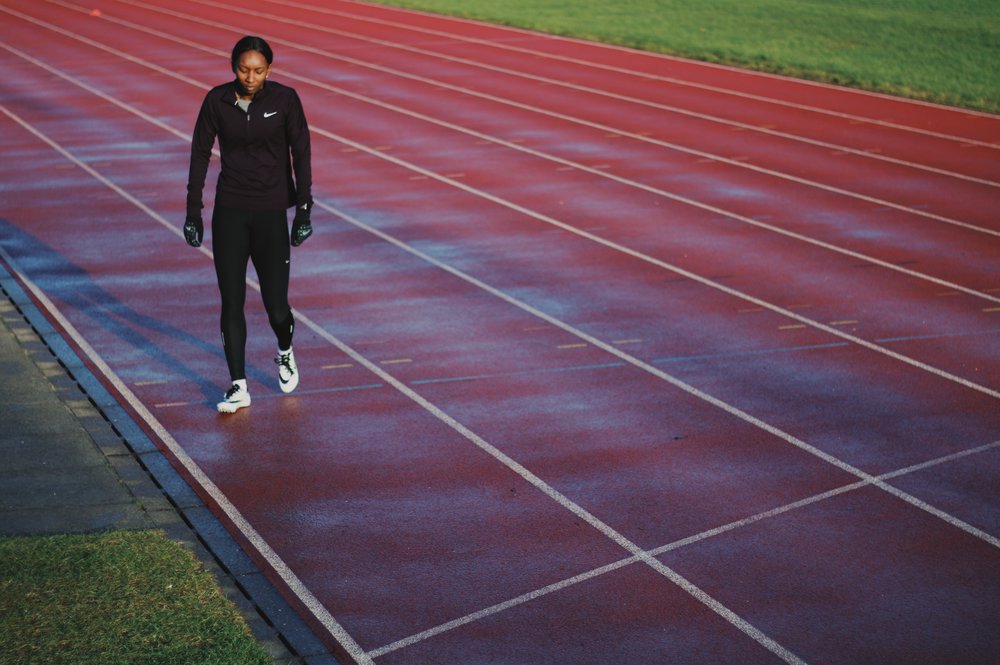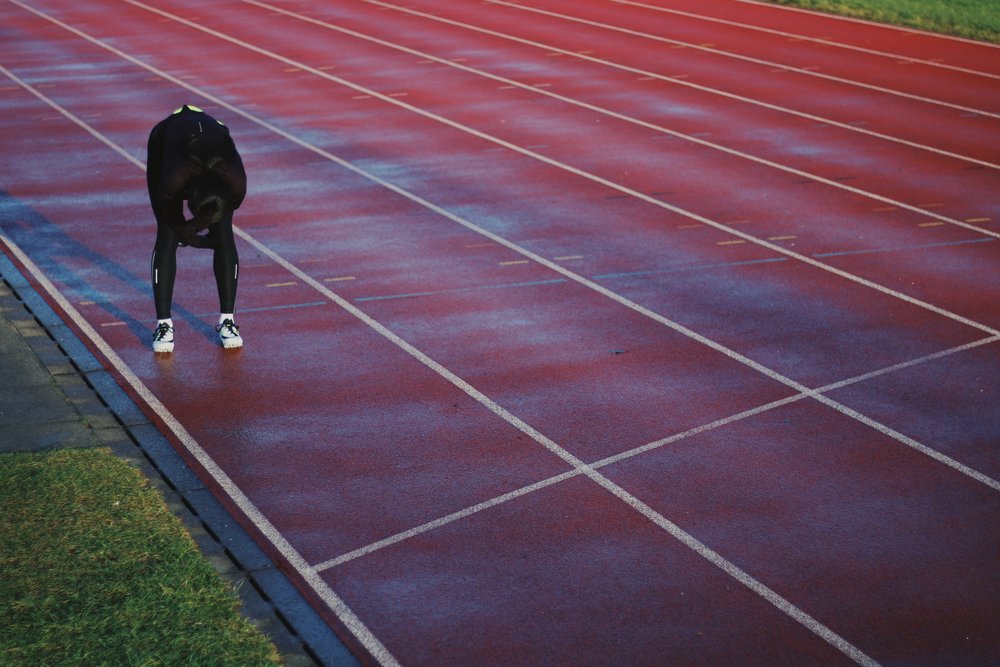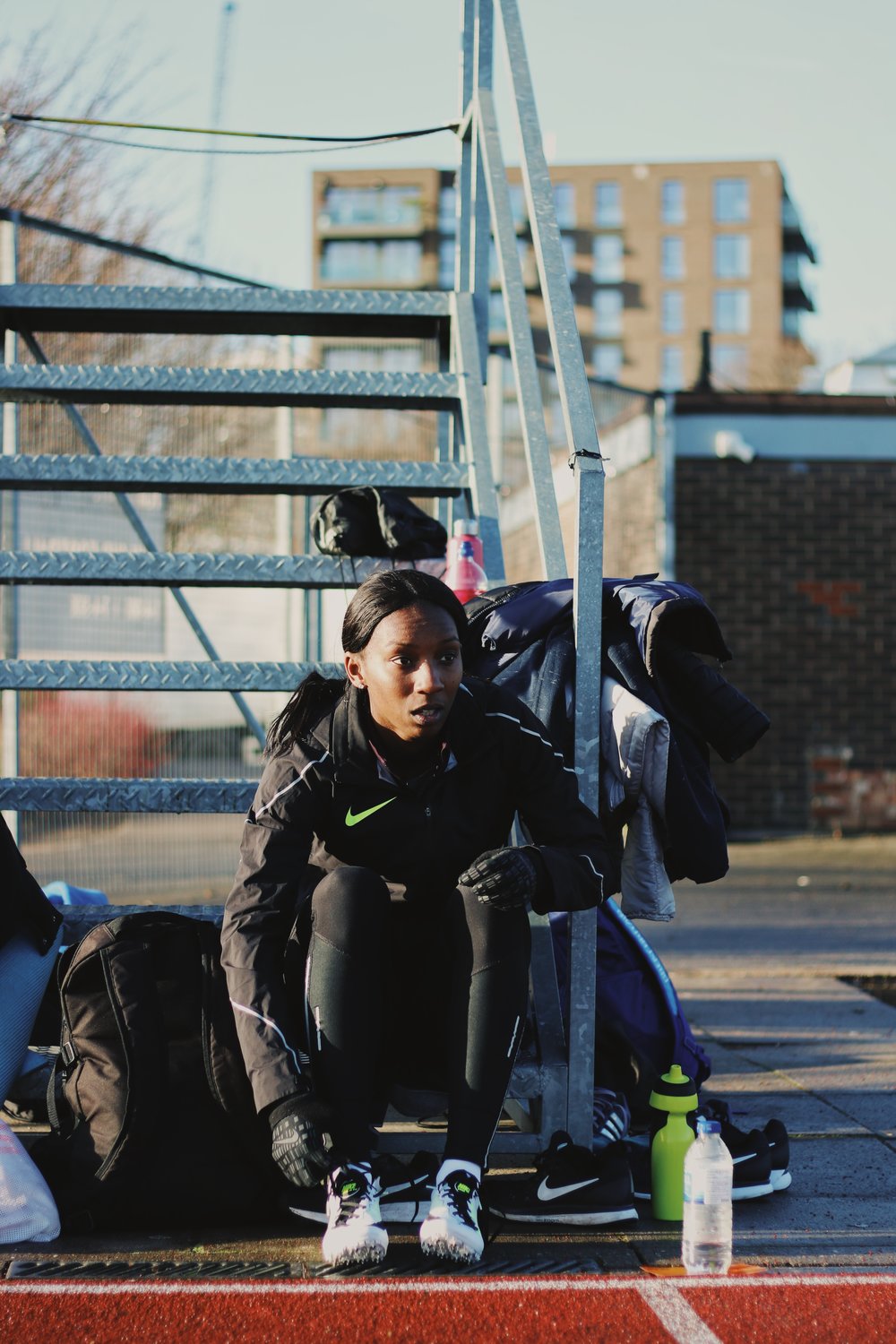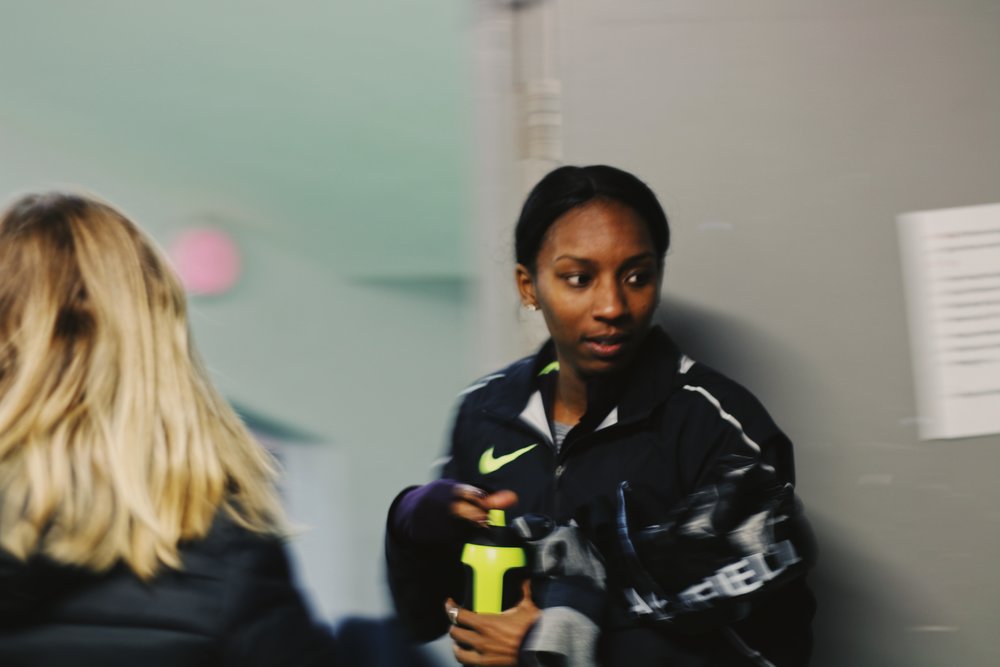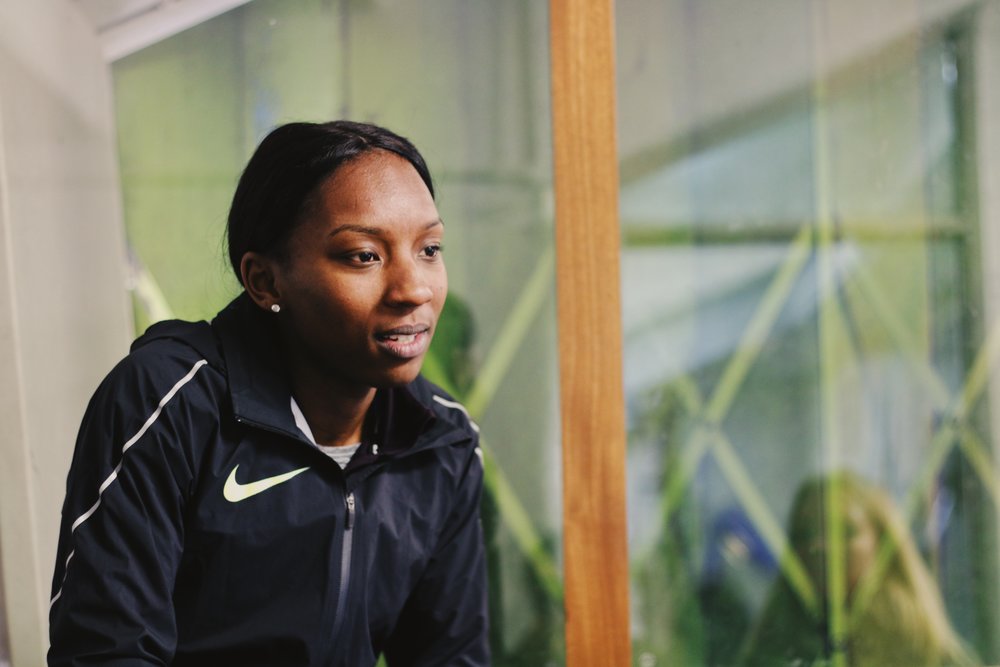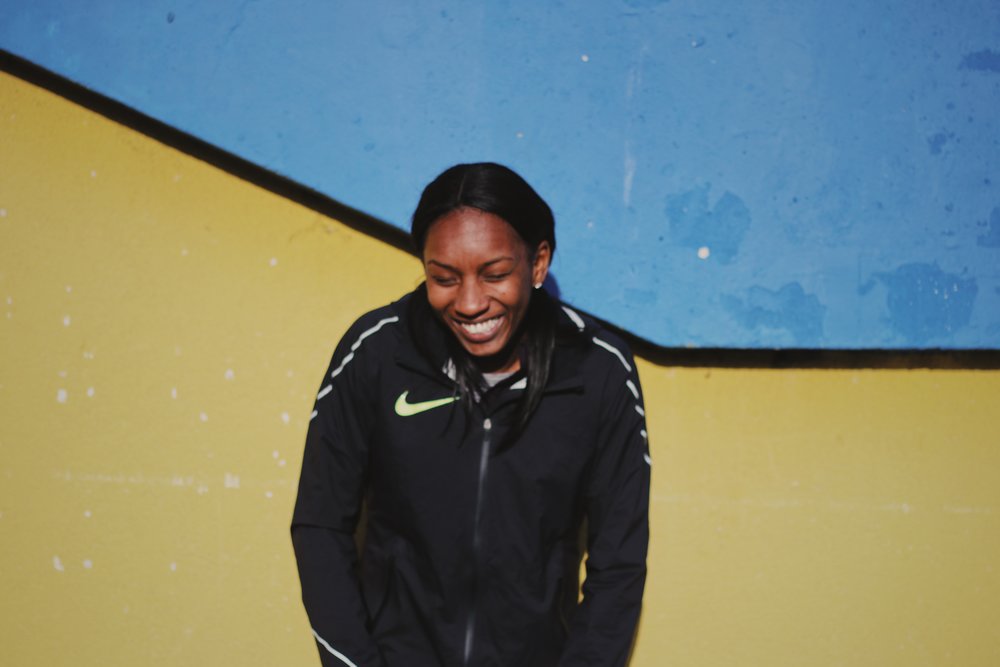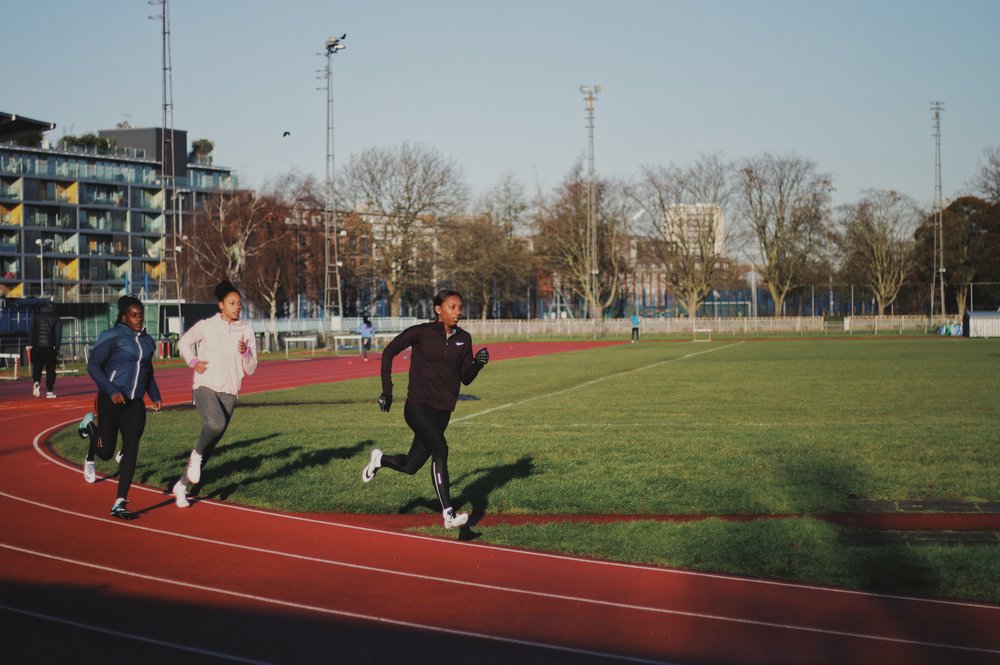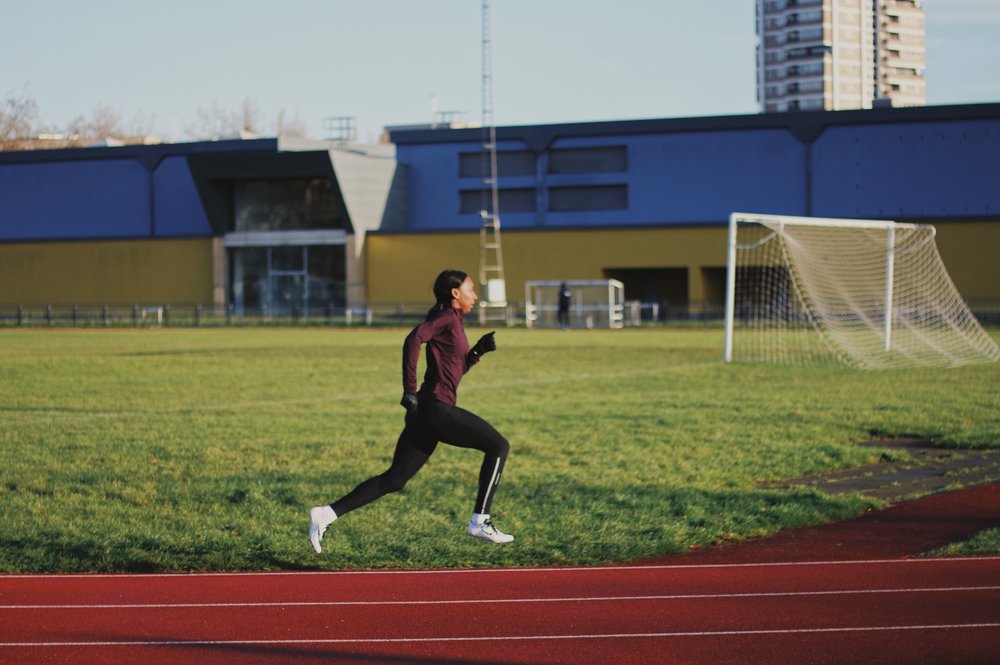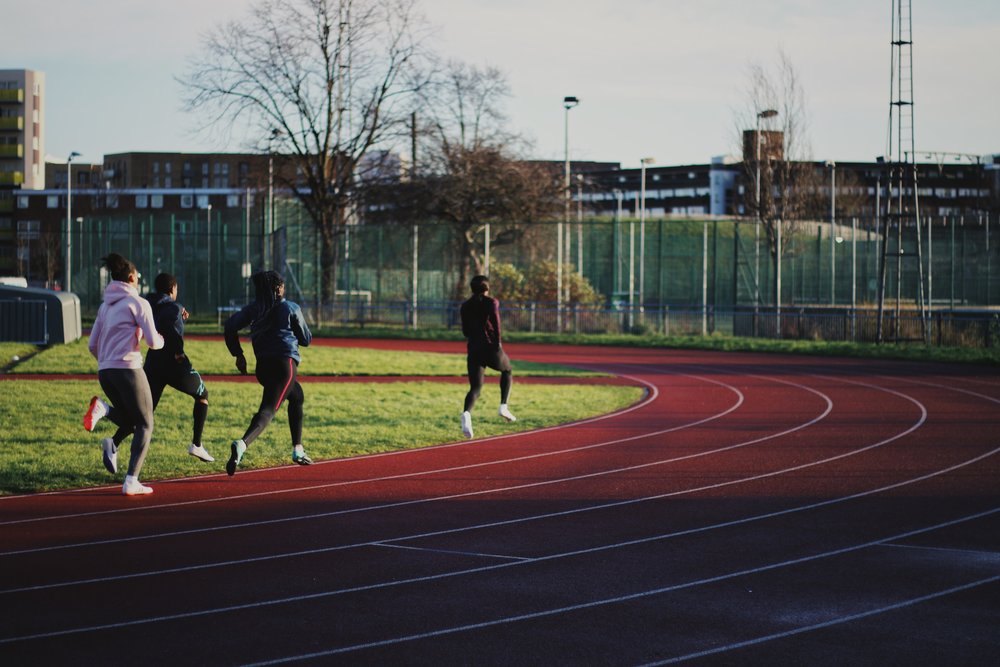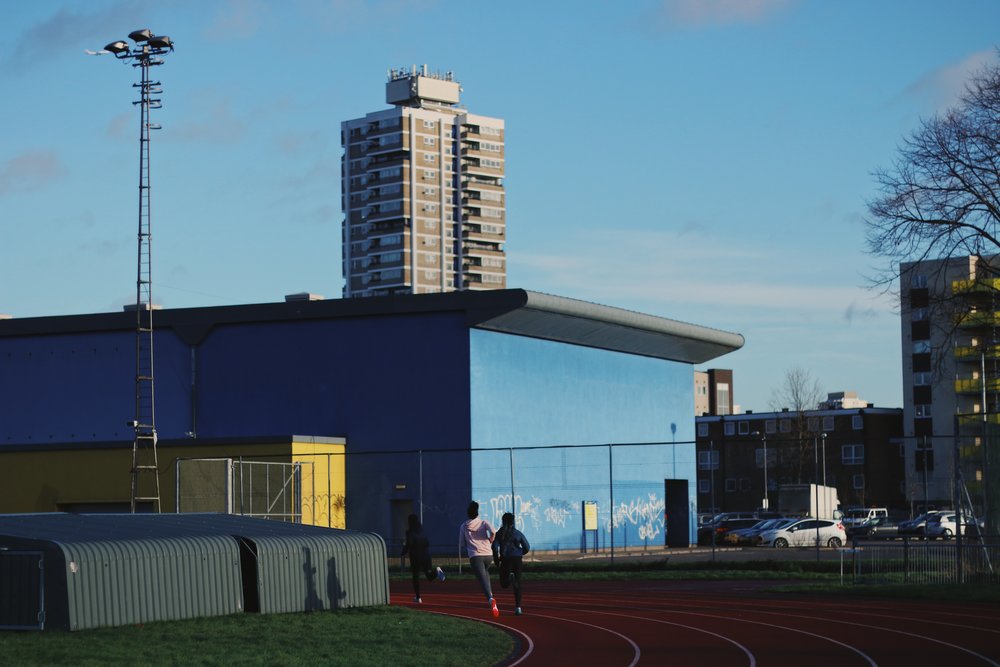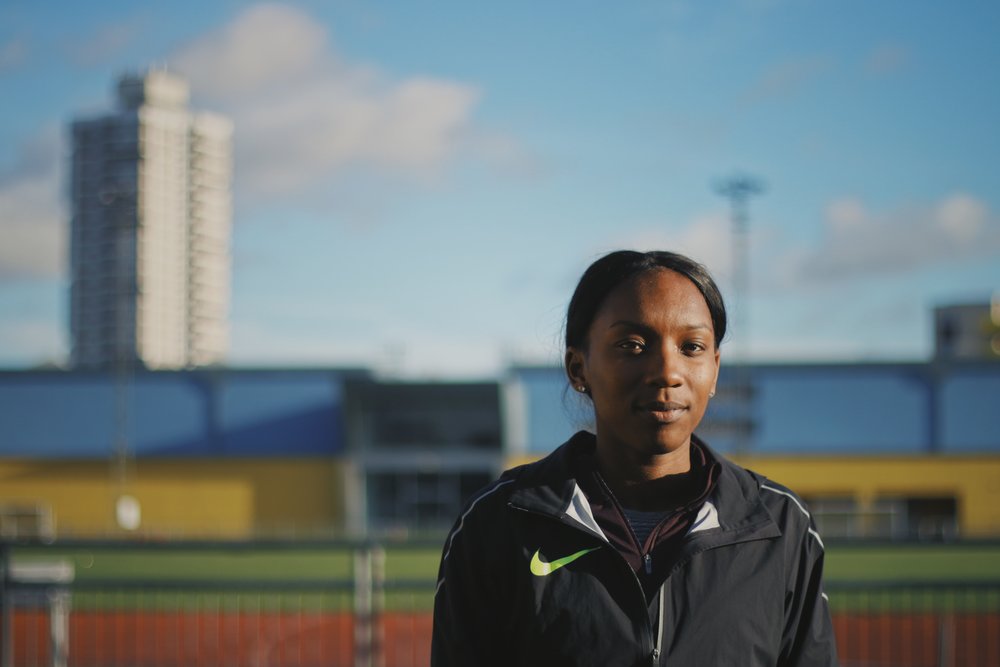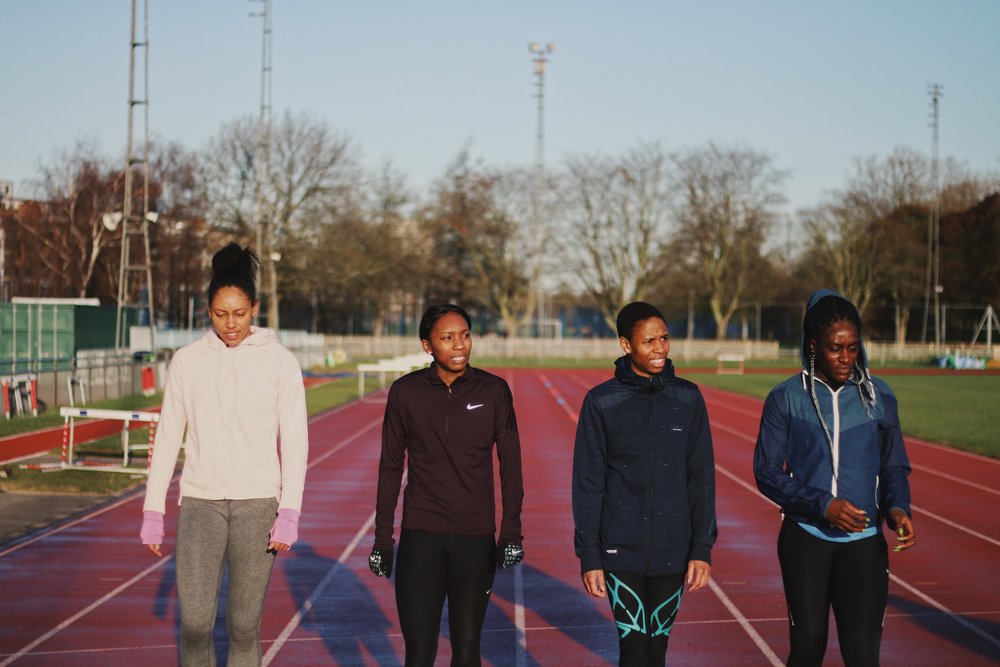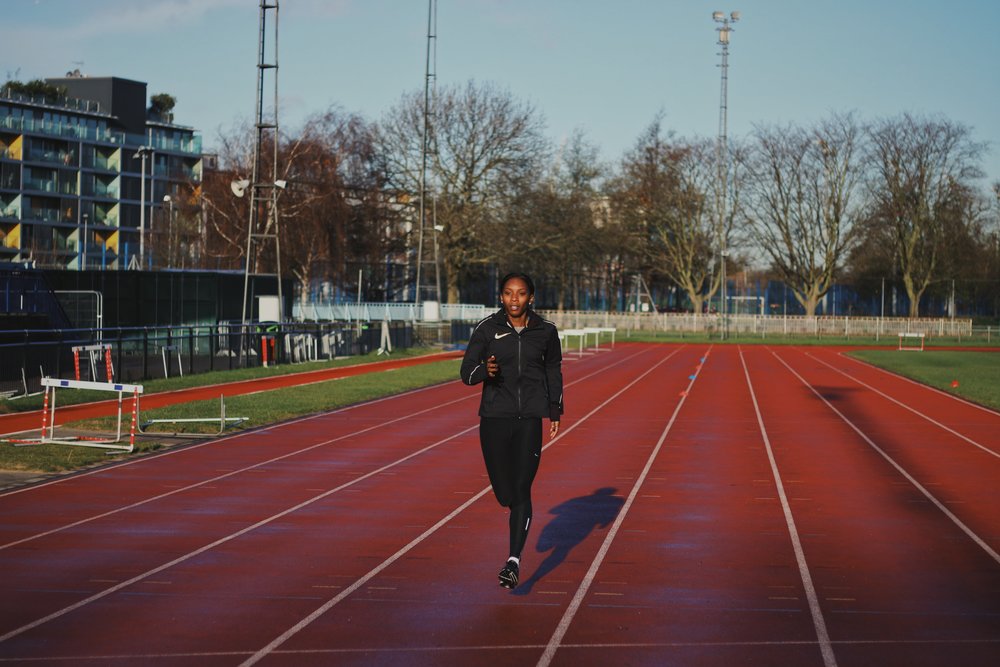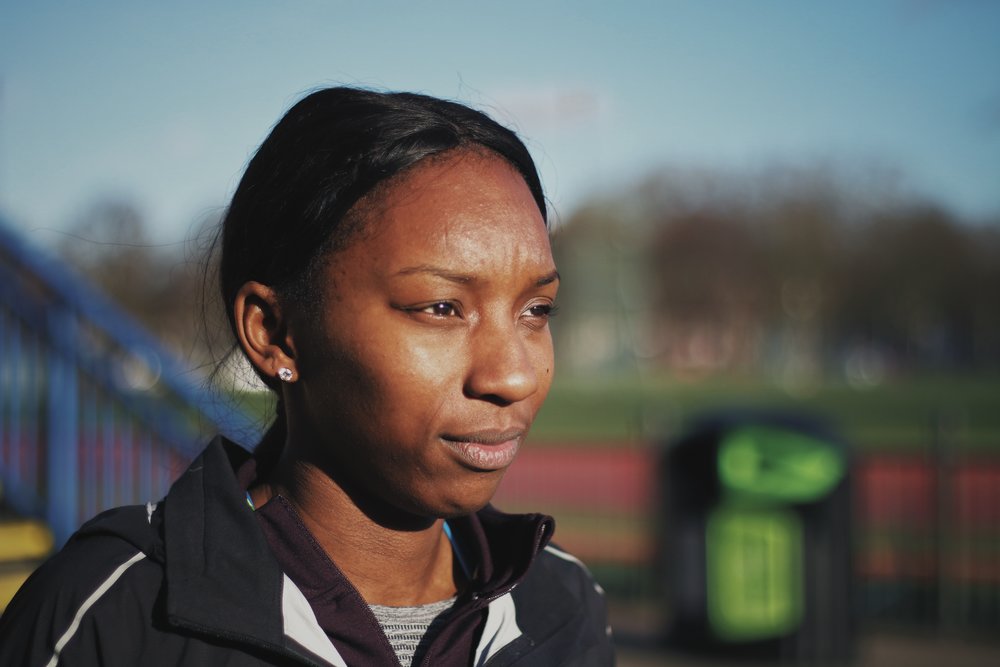Athlete Insight: Bianca Williams
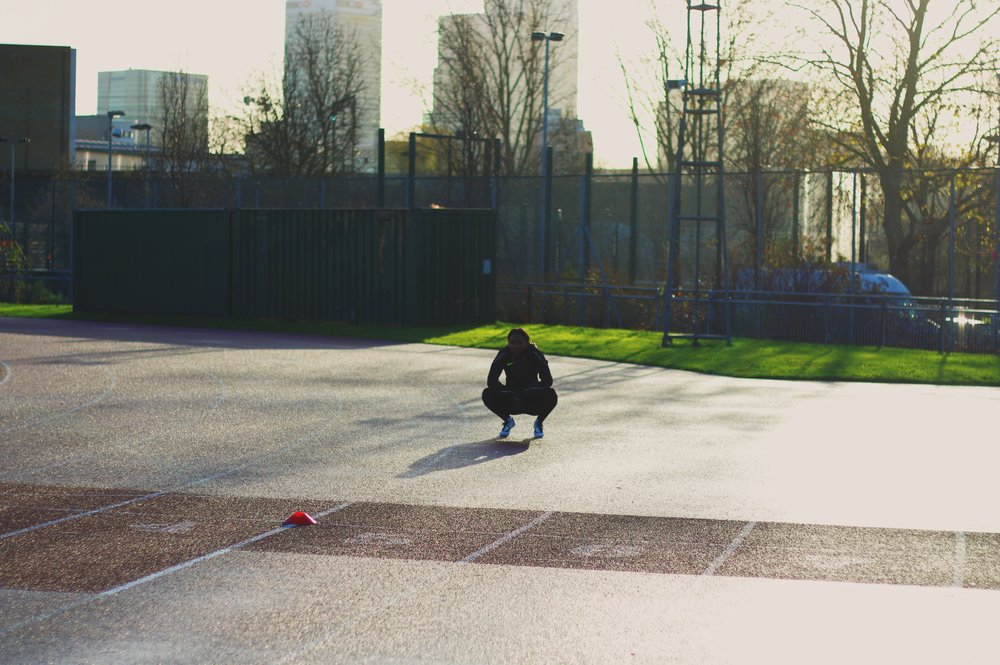
I’m meeting Bianca at Mile End park where she trains almost daily. It’s 8:30 am and she’s already on the track. It feels like a secret urban courtyard, flanked by a community sports centre and surrounded by tower blocks. Unless you knew what you were looking for, you’d not know that some of Britain’s top athletes are here training every day. The sun is still golden, rich light bouncing off the encompassing city adds a certain glamour to the morning.
“Why couldn’t I have been a basketball player! Why do I have to be outside? Who runs?!”
Bianca is getting warmed up with a handful of other athletes. Not in the race day kit you normally associate with sprinters, the scene is deceptively casual as the runners perform various drills. Whilst the light might be beautiful, the temperature is harsh – it’s 3 degrees out. There seems to be adequate rest time between exercises, meaning adequate time to lose heat, so Bianca is also wearing two pairs of gloves in an effort to keep it in. Multiple layers are taken on and off, and on again, and between sets Bianca sits and covers her legs with her jacket to stay warm. The climate is something Bianca comes back to a few times later on that morning when I ask her what the hardest part of her job is. “Waking up in the morning when it’s cold,” she says, “and also having a hard session when it’s cold which makes it even harder, and you question why you’re doing this. Last Saturday it was so cold and I thought, why couldn’t I have been a basketball player! Why do I have to be outside? Who runs?!”
The drills last for another forty minutes, slower than drills I had pictured for sprinters, and then the group change into their spikes to start the main session. They begin with a loop of the track, Bianca leading the other women – they’re training in different distances – and stopping when they reach about ¾ of the way round to walk the remaining distance back. They truly never look like they’re trying that hard, and yet at the end of each loop they are, without fail, noticeably exhausted. It turns out this exercise is the session, and they repeat this multiple times over the next hour. As we’re approaching 10am, their coach, Lloyd, asks one of the women, “have you got one more left in you or two more left in you?” “Two more slow ones” she sighs.
Like many track athletes in their early careers Bianca has dabbled across a few distances and tells me that the 200m is now her favourite, though that hasn’t always been the case; “I remember when I was younger I would hate doing the 200m and I loved doing the 100m. Doing the 200 I was just like, nah I don't want to do it, I don't want to. But now I prefer it. In August [my coach] made me do a 400, and I was like, this is 200 meters more than what I normally do, like what? What an earth are you doing?!”
The women take their spikes off at 10:20 to cool down and within ten minutes we’re inside trying to warm up again. The facilities inside feel old school, made up of couple of small, dimly lit rooms, and we dive straight into the big stuff – the big picture, the big goals, the big medals she’s going for. “[This] year I’ve got the Commonwealth Games. Three years ago I was a Bronze medallist in Glasgow [2014] so I’m definitely hoping to go out there in Australia and do the best I can and, touch wood,” she says looking around for some legitimate wood to touch, settling on the table she’s sitting on, “come back with a medal. And then we have the Europeans in Berlin so hopefully I will compete there and progress to the final.”
Is it daunting, I ask, when your major career goals are to win gold medals at events watched globally, and you can predict for the next decade what your major career goals will be? “I just take it one step at a time,” Bianca says calmly. “My next big thing is the Commonwealth, so I’m just thinking about that, and after that I’ve got trials and then Europeans and then next year the World Champs in Doha [2019] and then it’s the Olympics.” As she talks, she breaks them up into chunks and even though she’s talking about 2020 now, it does seem like a very systematic mental process. “You kind of know those things are in the future but you are thinking about the things that are closer to home. I’ve always been like that, I’ve never been one to plan ahead, I go with the flow. I like to take it one step at a time. I feel like if you focus on too much at once your mind will explode and you will lose track of what you’ve got to do. The world isn’t going to end so do what you have to do.”
It seems like a pretty healthy approach, necessary even, and I wonder if that method sounds true for the physical preparations as well. “I train Monday, Tuesday, Thursday, Friday, Saturday, Sunday and I get Wednesdays off, which is normally like a rest day. It's like an active rest day, staying fit and not falling back, not just staying in bed all day! Apart from Wednesdays, every day is hard.” She talks me through each session, alternating mostly between doing gym sessions, being on the track, and combinations of the two, and there’s always hill sessions early Tuesday morning. “It's intense, especially as it’s cold. The first thing to go are my feet. But you've just got to do it to get to where you need to be. I keep thinking, ‘it’s okay, in a few months I'll be in Australia.’”
Bianca grew up in Walthamstow where her mum still lives, and she goes between here and her partner’s place in east London which is conveniently close to where she trains in Mile End. I ask Bianca about how she got into athletics, expecting a variation on a story about starting at school and just never stopping, but she immediately grins and tells me how it actually went down. “I got chased by a dog when I was about 7 and, it was like a small, little dog, but I was so scared. My godfather who was there said that I outran the dog.” I’m laughing as she tells it energetically. After that, he took Bianca to the local track to try out athletics. At the time she liked it, but she wasn’t able to make the regular training sessions, and it was another five years before Bianca would start properly getting into the sport in her first year of secondary school. She tried football but, after fracturing her arm, she never went back.
So it’s been over a decade of training, of hill sessions and drills to get to where Bianca is now. I ask her about her motivations, if there are people or idols she thinks about when the alarm goes off, it’s still dark outside and she has a hill session in the cold to do. What is it that makes her get out of bed? “I think it is just knowing that I could be really successful, that I could be one of the best sprinters in the world. I know people like Shelly-Ann Fraser, and also Christine [Ohuruogu], other people in that room,” she says, looking over to the room next to us where the women she’s been training with are now, “they are getting up early and they are doing it, and I know that they have made themselves into champions and with hard work, you can get anywhere, but you have to put the work in. There are times where I wake up and I think ‘this is too early, I can’t’, but then you just think ‘nah, I can do this’, and it will set me up for the next competition. There are probably a lot of people out there not getting up and so you’re doing one better. You don’t know what all your competitors are doing but you know what you are doing. When you think of all the achievements you can gain and that I have gained at such a young age, it makes it all worthwhile, and then you kind of forget about last December in the cold. Until you have to do it again the next year!”
“There are times where I wake up and I think ‘this is too early, I can’t’, but then you just think ‘nah, I can do this’, and it will set me up for the next competition.”
It’s true – she has achieved a lot for a young athlete. We’re meeting the week before her 24th birthday, and to date she’s competed for England at the 2014 Commonwealth Games, where she won bronze medals in the 200m and in the 4 × 100m relay. She has also won two medals as part of the British team at the IAAF World Relays, with silver in the 4 × 200m in 2014 and bronze in the 4 × 100m in 2015. She ranks fifth on the UK all-time list in the 200m with her best of 22.58 secs. Not bad for someone who’s not yet 24.
At the moment Bianca is training as a full time athlete, despite last year coming off funding from UK Sport. For a time she did work alongside to support her training, but it wasn’t the right fit for her. I ask her how she’s managing to do it on her own. “It's quite hard because I didn't get funding again this year, so it's been a bit of a weird struggle. I've got to now manage my income and because I'm not really working it is a lot harder to, I don't know… live, really.” Some of this is helped by money from competing, but even then it’s a small portion of the year and whilst you might compete May through to September, you actually don’t get paid until October. I ask Bianca, when you’re racing in May, are you literally thinking, ‘don’t worry, not long ‘til that October pay day’. She responds with a mantra, “just keep going, just keep going. Just don't get myself into any debt! It is hard,” she continues, “I rely on my partner quite a bit, he's been really good when it comes to helping me out, like paying for things if I can't. If I didn't have him, it would be a lot harder and I'd have to work a lot more.”
Bianca has been sponsored by Nike for the last five years, and I ask if that helps her afford to be an athlete full-time. “Oh my god it does. We get a thing called a comp and you order what you need and say your allowance is £500, that’s a pair of trainers, tracksuit top and bottoms, a t-shirt, and maybe one more item and that’s literally the money gone, so imagine not being sponsored! This sport is so expensive, I’m just so grateful that I have the opportunity. It’s been such a blessing and I don’t think many athletes would be able to carry on without sponsorship.” Are there other financial benefits to being sponsored? “They do give you money,” she explains, “but it’s the kit that is more important because if you don’t have kit, what would you do? It’s so expensive now, you don’t realise when you are younger. Life is hard so you just have to be happy with what you’ve got, and always give back, ‘cause I remember when I was younger people would give me their old trainers and stuff.”
I ask how much the rest of her life involves athletics–does she tend to hang out with a lot of athletes? ”A bit of both really. I’m really close to Asha Philip. We always send each other videos and pics on Instagram. We don’t speak on the phone everyday but we do somehow connect which is really cool. My training group I speak to everyday. There is one girl I train with, Simone, who I speak to before we are at the track, when we leave the track, we’re always talking. It’s nice to have friends like that but it’s nice to have friends outside athletics too so I don’t have to talk about it all the time. It gets really boring. Even my mum when I come home asks ‘how is the training?’, and I’m like ‘ugh! Come on ask me something else, ask me how the dog is!’” What does she do in her down-time, I ask? “I love eating!” she says, enthusiastically. She tells me she’s pretty good at cooking, chicken and rice being her speciality. And there’s the sleeping – it sounds like it takes a lot of sleeping to make an athlete this fast.
Bianca graduated in 2016 and whilst she’s undoubtedly determined to be the best athlete she can be, she’s definitely got one eye on her future career. What will she want to do when this is all over? She studied at the University of East London, a stone's throw away from where we’re chatting now, studying sports science and juggling training with getting her degree. Whilst she’s not missing it – she tells me it wasn’t really for her, the theory side of sport can be pretty dry – it hasn’t put her off studying altogether and she’s considering applying for a masters degree in marketing which she would continue to train alongside. “I need to think about my life after athletics. It is such a small period and doesn’t last long – it is a very short window to make money, and not everyone is going to make money. So I’ve got to think about where my life is going to be...and I just can't wait to study something and keep my mind active. All I'm doing now is going home, sleeping and walking my dog.”
Bianca’s mind sounds pretty active already – conversation flows quickly and I predict studying alongside training wouldn’t be difficult for her to juggle again. I start to wrap it up, aware that this isn’t the end of Bianca’s working day and she’ll be rejoining the other athletes, or the ‘quarter miler club’ as she calls them, to finish up training. I’m glad we got to meet at the track I tell her, where she seems very much at home. Bianca has given me the illusion of it being simple, her methodical approach clearly working, but it’s clear that she’s worked fiercely hard to get to where she is now. I suggest this to her and she responds, “you know what? I just love full time training.” And I suppose that that’s what people do when it comes naturally to them, when it feels absurd that they would be doing anything else.
